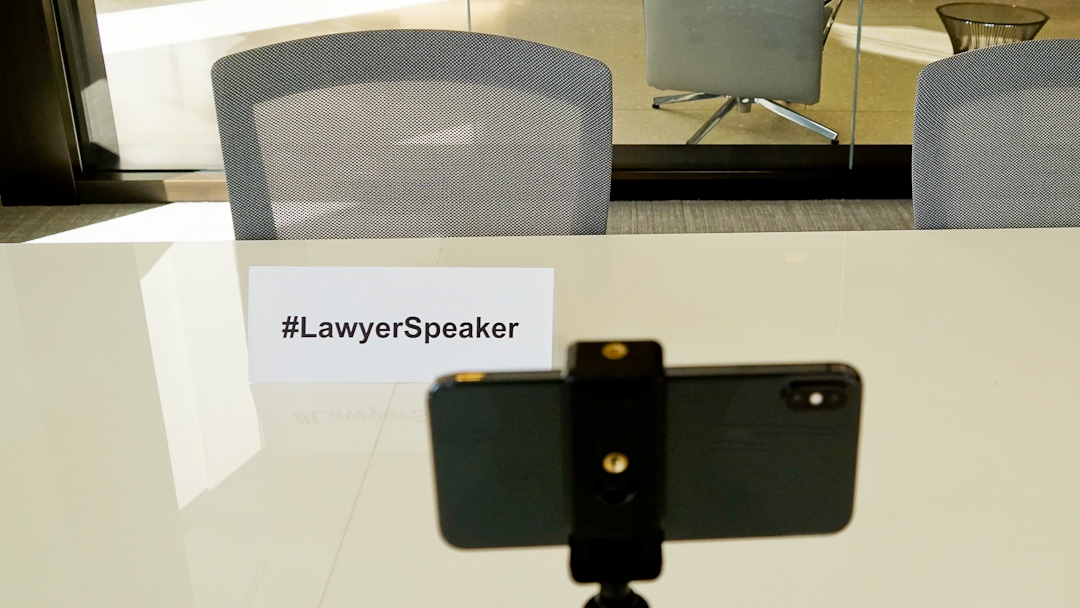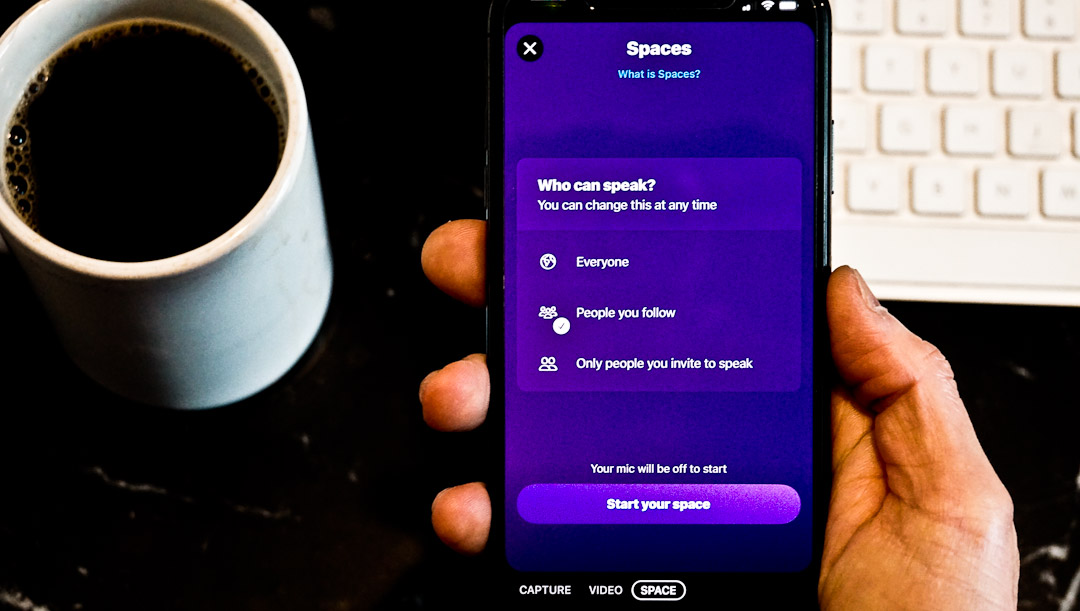
Seeking a Speaking Engagement? Shout It Out!
Although you do not literally need to shout out that you are interested in a speaking role, you should tell people about this interest. Inject the speaking opportunity you seek into someone’s mind. They may be approached for speaking engagements they are unable to accept (such as due to timing) or for speaker suggestions from their network. Increase your chance of being part of their consideration.
Social Media Examples
One way to let others know about your interest in speaking is to state it on social media.
For example, Department of Justice lawyer Naiyna Sharma once had a pinned tweet stating: “I am exploring my newfound love for moderating panels. If you are ever hosting a panel on diversity, inclusion or women and need a moderator. Voilà here I am.”
On LinkedIn, the summary of bilingual workplace lawyer and workplace investigator Marie-Hélène Mayer ends with a call to action which mentions speaking engagements. She states:
“LET’S GET TO THE FACTS. Contact me at 416.549.1686 to discuss:
-
- The facts of your workplace concerns
- Training and speaking engagements on the topics of workplace investigations and workplace communications”.
A similar example is found at the end of the LinkedIn summary of technology and outsourcing lawyer Parna Sabet-Stephenson. Parna invites her audience to contact her “to learn more about Gowling WLG’s Technology and Outsourcing, FinTech or InsurTech Group, or to discuss a potential speaking/writing opportunity.” The reference to a writing opportunity can help with landing a speaking engagement.
Write to Speak
Blog posts and articles are useful ways to get people to know about your areas of expertise (i.e. topics you can speak about). It is not unusual for conference organizers, editors, and journalists to do online research to see who they can approach to speak, write, or interview. This research ranges from discovering who to approach, to learning more about a person, to confirming that she is someone appropriate to reach out to.
Writing can be a lot of work, but it can be a rewarding long-term strategy. Lindsey Bombardier, Director of Marketing and Business Development at Lenczner Slaght, states:
Like it or not, developing original content continues to be an important marketing tool for firms and lawyers. Whether it’s a client alert, post for the firm blog, or industry article, writing can help build a lawyer’s profile. For obvious reasons, writing often makes a difference and can help get you noticed for a speaking gig.
Lindsey shares these three points:
Focusing on timely and relevant content is important. In my world, that means ensuring that our lawyers are writing about precedent-setting cases or cases with novel legal issues and providing their perspective on how those cases will impact our clients businesses. Format also makes a difference. Writing for a business audience (not a lawyer audience!) is best and if you can structure your article so that it can be easily translated into a presentation, do that. And like most marketing tools, consistency is key.
If you are a lawyer with marketing and/or BD support, Lindsey urges you to use those resources. She explains:
Part of our job is to develop content plans, keeping the points above in mind, and to ensure that media and other industry organizations understand the content available and the expertise of any given lawyer. These outlets are almost always looking for content or for speakers – help them, help you!
If you can regularly post content that is of value to your audience, you will build a writing portfolio. That writing portfolio is essentially a virtual introduction that can help you build your speaking portfolio.
Share the Writing or Quote on Social Media
Once your blog post, article, or quote in an article has been published, create or share a social media post with a link to that blog post or article. Communicating such activities to your social media network help to increase awareness of you and stay top of mind.
When sharing that you have been quoted, do not simply state, “I was quoted in [name of publication].” You should at least add a one-liner about why someone would be interested in clicking on the link to read what you talked about, or provide a description of what was discussed. These additional words also help with having your post or tweet appear when users conduct keyword searches on a social networking platform.
Be a Thought Leader on Social Media
To help with consistently sharing content of value as an expert in the area, use social media to convey your thought leadership. You can comment on third party content your audience is interested in and relates to the areas you want to speak about.
Sacha de Klerk, Head of Diversity and Inclusion at Norton Rose Fulbright Canada LLP, confirms that “social media can be a great tool to help position and promote your expertise as a speaker, moderator and thought leader.” She suggests, “If you read an interesting article, write a short opinion when you share it to your social media to demonstrate your knowledge or opinion on the topic.”
Leverage Your Speaking Momentum
Once you have landed a speaking role, share your enthusiasm for the engagement on social media. Sacha shares these practical steps when you are invited to speak or moderate:
1. Before any speaking engagements, promote the event on your social media. Use an image or yourself, tag the organisers and any fellow speakers and write a one line description to highlight your topic. Images of yourself will tend to get higher engagement than posts with no images or generic images. If you feel up for it, record a short video to post!
2. At the speaking engagement, ask someone to take an ‘action shot’ of you. Post it to your social media channels. Make sure to tag fellow panellists and organisers so that they can share and amplify your post. Make sure to share and amplify theirs in return.
So for your 2020 plan, what are you going to do to increase awareness of yourself to land those speaking/writing engagements? Will you let someone know about your interest in speaking to be featured in a #LawyerSpeakHER video? Keep reading!
[Update: The hashtag to profile women-identified lawyers has been changed from #LawyerSpeaker to #LawyerSpeakHER. Thank you to accredited mediator Christine Kilby for perceptively seeing “her” in the hashtag.]
#LawyerSpeakHER Roster
Let us increase the awareness of women lawyers and the law- or legal profession-related content they want to speak about at conferences and other events.
Please take a moment to reflect on identifying a woman lawyer you want to hear more from. She can be a junior or senior lawyer. Then help build a roster of women lawyers you want to see on the speaking circuit.
I will start us off by posting on social media a video of myself and a lawyer I would like to see move from a moderator role to a speaker role.
In my post showing the video, I will tag one female lawyer and one male lawyer to participate in this video challenge. In turn, each of the tagged lawyers will:
- Create their own video with a female lawyer they recommend as a speaker; and
- When sharing the video on social media:
- Tag a female lawyer and a male lawyer to be part of this challenge (reach out to them first); and
- Use the hashtag #LawyerSpeakHER.
If you want to take part in this #LawyerSpeakHER challenge, you do not need to wait to be tagged. Simply do the same two steps listed above as though you were tagged.
If you are tagged in a post or tweet to add to the #LawyerSpeakHER roster, do not feel rushed to identify someone. You can acknowledge you were tagged with a message like “I will participate” or “I have a lawyer in mind. Stay tuned.”
Even though this roster is launched around International Women’s Day, we need to help elevate others in the legal profession all year round.
Take time to reflect on who to introduce and how best to make her shine in the video. For instance, in terms of content, consider mentioning how you know the lawyer, where you have seen her speak, or why she would be a great speaker. Ask her a question or two to highlight what she is interested in speaking about so the video is not just a generic statement about the areas of law she practices in. For example:
- Are there recent trends she would be interested in presenting about?
- Does her subject matter expertise include related expertise beyond law such as prior business or technical experience?
- Does she have any speaking or career-related tips she wants to share?
Remember, specificity resonates more than broad or vague statements. This is an opportunity to elaborate on the lawyer’s virtual introduction (i.e. to say something that is not found in the lawyer’s website biography).
Also, keep the video short. If you upload a video onto Twitter and want the full video to be viewable, keep your video under 2 minutes and 20 seconds.
Each speaking event, including being part of a #LawyerSpeakHER video, adds to a lawyer’s profile. Nikki Gershbain, Chief Inclusion Officer at McCarthy Tétrault LLP, expresses:
The #LawyerSpeakHER challenge is an innovative way to profile women-identified lawyers for speaking opportunities. For any lawyer, developing a profile as a subject matter expert or thought leader is an important part of building a successful practice. Unfortunately, when it comes to speaking opportunities, extremely talented women don’t always receive the air time they deserve. Help organizers avoid a “manel”! Organizers, check out the hashtag #LawyerSpeakHER and discover some amazing women for your next conference, keynote or panel.
Now, it’s time for us help those extremely talented women lawyers shout out their speaking engagement interests!




